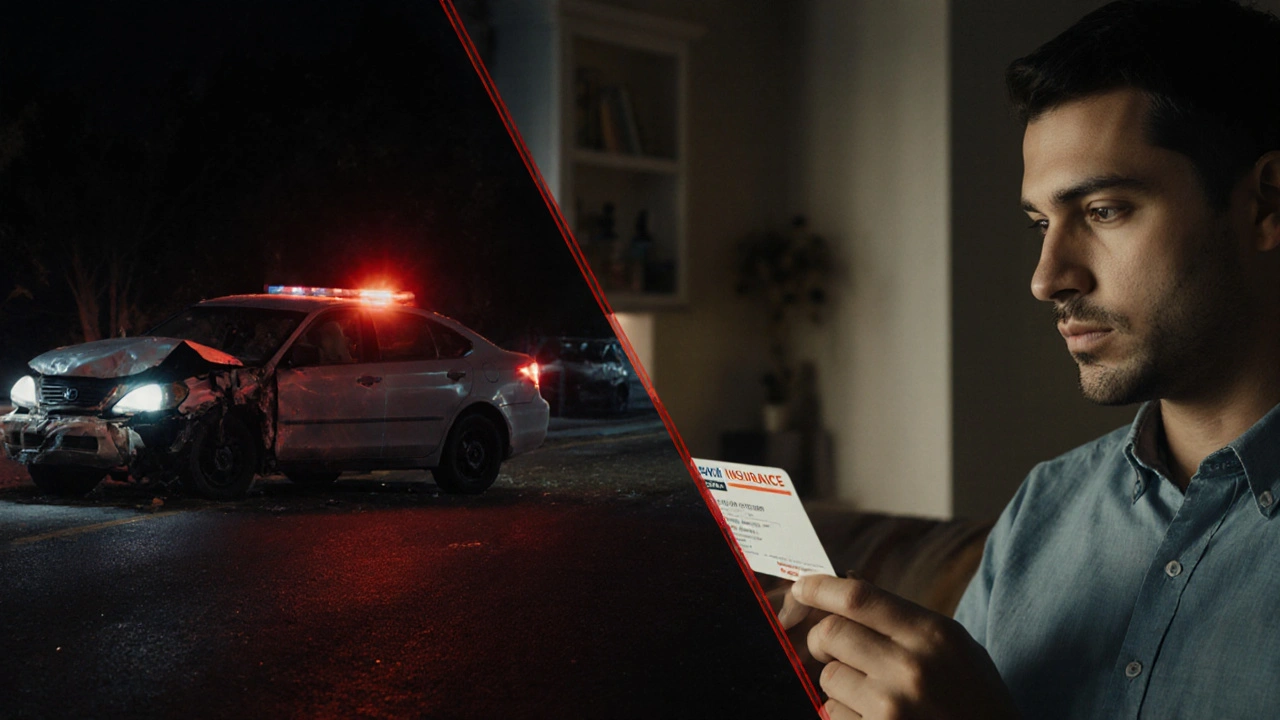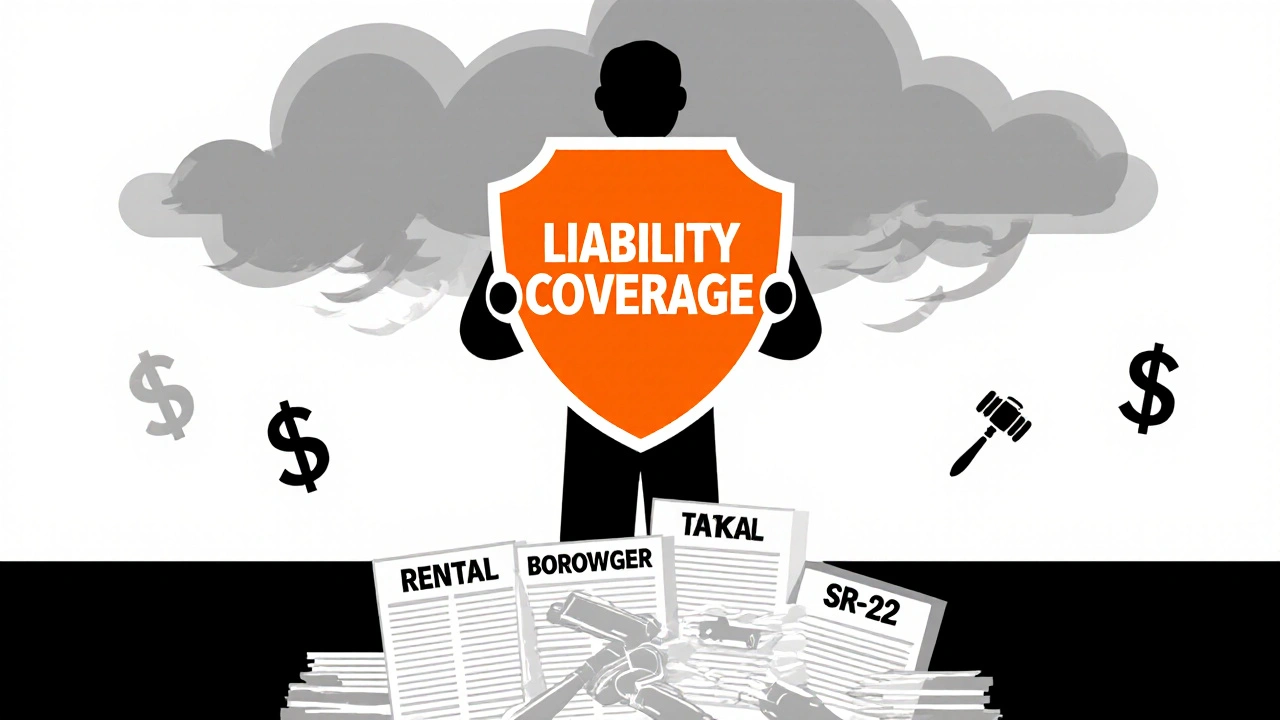What if you don’t own a car but still drive one? Maybe you rent cars sometimes. Or borrow a friend’s vehicle. Or use car-sharing services like Zipcar or Turo. You might think, "I don’t need insurance-I’m not the owner." But that’s a dangerous assumption. If you get into an accident while driving someone else’s car, liability doesn’t disappear just because the title isn’t in your name.
Why Non-Owner Insurance Exists
Most car insurance policies cover the vehicle, not the driver. That means if you drive a car that’s not yours and you cause an accident, the owner’s insurance kicks in first. But here’s the catch: if the damages exceed their policy limits, you become personally responsible. That could mean lawsuits, wage garnishment, or even losing your savings. Non-owner car insurance steps in as a safety net. It doesn’t cover damage to the car you’re driving-it covers injuries and property damage you cause to others.This type of policy is designed for people who need liability protection but don’t own a vehicle. It’s not for daily drivers. It’s for those who drive occasionally but still face real legal and financial risk.
What Non-Owner Insurance Actually Covers
Non-owner policies are lean. They only include two things:- Bodily injury liability: Pays for medical bills, lost wages, and pain and suffering of people you injure in an accident.
- Property damage liability: Covers repairs or replacement of other people’s vehicles, fences, mailboxes, or buildings you hit.
It does not cover:
- Damage to the car you’re driving
- Your own medical bills
- Rental car fees
- Theft or vandalism
Think of it like renter’s insurance for drivers. You’re not protecting the property-you’re protecting yourself from being sued.
Who Needs This Policy?
You might think this only applies to people who drive rarely. But here are real situations where non-owner insurance isn’t optional:- You rent cars frequently for business trips.
- You borrow your spouse’s car when yours is in the shop.
- You use car-sharing apps like Turo or Getaround.
- You’re required to file an SR-22 after a DUI or suspended license.
- You’re between cars but still need to drive occasionally.
One common scenario: A person gets their license back after a DUI. The state requires them to carry an SR-22, but they don’t own a car. Without non-owner insurance, they can’t get their license reinstated-even if they never plan to buy a vehicle.
How Much Does It Cost?
Non-owner policies are among the cheapest car insurance options. On average, they cost between $200 and $500 per year. That’s less than most monthly phone bills. Prices vary based on:- Your driving record (tickets, accidents, DUIs)
- Your location (urban areas cost more)
- Your age and credit score
For example, a 32-year-old with a clean record in Texas might pay $240/year. Someone in New York with a speeding ticket might pay $620. It’s not a one-size-fits-all price, but it’s almost always cheaper than a full policy.

How It Works With the Owner’s Insurance
When you drive someone else’s car and get into an accident, here’s the order of payment:- The owner’s insurance pays first, up to their policy limits.
- If the damages exceed those limits, your non-owner policy kicks in.
- If you don’t have non-owner insurance, you pay the rest out of pocket.
Let’s say the owner has $50,000 in liability coverage. You cause an accident that results in $85,000 in medical bills and property damage. The owner’s insurance pays $50,000. You’re on the hook for $35,000. If you have non-owner insurance with $100,000 in coverage, your policy pays the remaining $35,000. Without it? You’re paying that $35,000 yourself.
When It’s Not Enough
Non-owner insurance won’t help if you’re driving a car you regularly use. If you live with someone and drive their car every day, insurers will expect you to be listed on their policy. If you’re not, and you crash, your non-owner policy might be denied. Insurance companies look at patterns-not just single events.Also, if you’re driving a rental car and want coverage for damage to the rental, non-owner insurance won’t help. You’ll need the rental company’s collision damage waiver or a credit card with rental coverage.
How to Get a Non-Owner Policy
Not every insurer offers non-owner policies. Major carriers like Geico, Progressive, and State Farm do. Smaller regional companies might not. Here’s how to find one:- Call your current insurer-even if you don’t own a car, they may offer non-owner coverage.
- Use online comparison tools like The Zebra or Insurify.
- Ask specifically for "non-owner liability insurance"-don’t just say "car insurance." Many agents won’t know the term.
- Be ready to provide your driver’s license number and driving record.
Some insurers require you to already have a license and proof of residency. You don’t need to own a car, but you do need to be a licensed driver.

SR-22 and Non-Owner Insurance
If you’ve had a DUI, reckless driving, or license suspension, your state may require an SR-22 filing. This isn’t insurance-it’s a form your insurer files with the DMV to prove you have liability coverage. Many drivers assume they need to buy a car to get an SR-22. That’s false. You can get an SR-22 with a non-owner policy.Just make sure the insurer you choose files SR-22 forms. Not all do. Ask directly. Some companies charge an extra $25-$50 to file the form. That’s still far cheaper than buying a full policy for a car you don’t own.
What Happens If You Don’t Have It?
The biggest risk isn’t getting caught-it’s getting sued. If you cause a serious accident while driving someone else’s car, the victim can sue you personally. Your home, your savings, even your future wages can be at risk. In states with high minimum liability limits (like Michigan or Florida), a single accident can cost over $100,000 in damages.And if you’re caught driving without insurance-especially if you’re required to carry it-you could face fines, license suspension, or even jail time in extreme cases.
Alternatives to Non-Owner Insurance
Is there another way to protect yourself? Sort of.- Rental car insurance: Most rental companies offer liability coverage, but it’s expensive-$10-$20 per day. If you rent often, it adds up fast.
- Credit card coverage: Some premium cards offer secondary rental car insurance, but rarely cover liability. Always check your card’s terms.
- Being added to a friend’s policy: If you drive someone’s car regularly, ask to be listed as a named driver. This is often cheaper than a non-owner policy.
But none of these are as reliable or cost-effective as a non-owner policy if you drive occasionally and don’t own a car.
Final Thought: It’s Not About Ownership-It’s About Responsibility
Car insurance isn’t about who owns the vehicle. It’s about who’s behind the wheel when things go wrong. You don’t need to own a car to be legally and financially responsible for what happens while you’re driving it. Non-owner insurance is a small, affordable way to protect yourself from life-changing costs. For under $500 a year, you’re buying peace of mind-and legal protection. If you drive, even once a month, it’s not a luxury. It’s a smart move.Do I need non-owner car insurance if I never own a car?
Yes-if you drive any vehicle that isn’t yours, even occasionally. Without insurance, you’re personally liable for any damage or injuries you cause. Non-owner insurance protects you from lawsuits and financial ruin, even if you never plan to buy a car.
Can I get non-owner insurance with a suspended license?
No. You must have a valid driver’s license to get non-owner insurance. If your license is suspended, you can’t legally drive, so insurers won’t issue a policy. You’ll need to reinstate your license first.
Does non-owner insurance cover me in rental cars?
Yes, for liability. If you cause an accident in a rental car, your non-owner policy will cover injuries and property damage to others, up to your policy limits. But it won’t cover damage to the rental car itself-you’d need the rental company’s collision coverage for that.
Can I use non-owner insurance for ride-sharing like Uber or Lyft?
No. Non-owner policies exclude commercial use. If you drive for Uber, Lyft, or any ride-share service, you need a commercial policy or a ride-share-specific insurance product. Using non-owner insurance for ride-sharing can void your coverage and leave you unprotected.
Is non-owner insurance cheaper than a full policy?
Yes, significantly. A full policy averages $1,500-$2,000 per year. Non-owner policies cost $200-$500. That’s because they don’t cover physical damage to vehicles-only liability. If you don’t own a car, you’re only paying for the protection you actually need.

